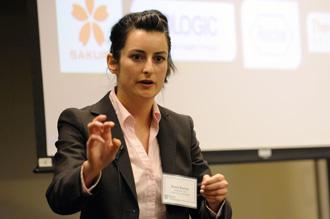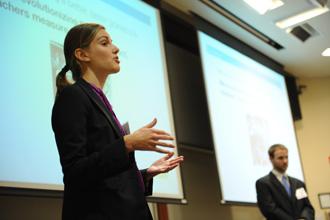Medical device company earns top prize at Tulane Business Plan Competition
For more than 250,000 women diagnosed with breast cancer each year, lumpectomy surgery offers a less disfiguring, less traumatic alternative to mastectomy, but breast-conserving procedures have traditionally been less effective than mastectomies due to the difficulty of precisely excising and analyzing the cancer tissue.
Pathostat, a startup company based at the University of Arizona, hopes to change that with a new medical device technology that makes the analysis of tumors faster and more accurate, and for that innovation, the company earned the grand prize of $50,000 at this year’s Tulane Business Plan Competition.

In winning the competition, Pathostat edged out Drop the Chalk, a software development company targeting charter school teachers, and OsComp Systems, developer of a patent-pending natural gas compression technology.
The Tulane Business Plan Competition, an annual presentation of the Tulane Entrepreneurs Association, took place on Friday (April 8 ) at the Freeman School with the winner announced at an awards ceremony later that evening at the Audubon Tea Room. The three finalists, which were chosen from more than 70 entries, presented their plans in Goldring/Woldenberg Hall II before a live audience and a distinguished panel of judges.
Pathostat earned high marks from judges for developing a kit that pathologists can use to accurately analyze breast tissue while the patient is still on the operating table. The tissue is suspended in a quick-hardening gel that enables the pathologist to make thin, accurate slices to determine if all the cancer cells were removed or if the surgeon must remove additional tissue. The device has the potential to greatly improve the success rate of lumpectomies, reducing the need for additional surgeries, and the developers say the technology can be expanded for use in other types of cancer surgery as well.
“We felt as though Pathostat was addressing an unmet need in a very large market where there’s a lot of emphasis and a lot of potential for interest from investors down the road,” said competition judge Michael LeBourgeois (MBA ’00), principal with the private equity firm NGP Energy Technology Partners. “They are attacking an important area with a good, practical approach, and there was a lot of passion and drive on the part of the entrepreneurs. I think that resonated with the judges.”
The Tulane Business Plan Competition is the nation’s only competition dedicated to the principles of conscious capitalism, which emphasizes the importance for businesses to positively affect all stakeholders and the communities in which they operate. Pathostat CEO Xenia Kachur said the company didn’t have to look far to find its social purpose.
“We’re doing something that really has the potential to change people’s lives,” Kachur said. “That’s our goal. We’re trying to create a profitable and sustainable company, but our primary purpose is to help people.”

Thanks to a gift from real estate development and management firm the Domain Companies, this year’s event included a second competition open solely to New Orleans-based entrepreneurial ventures.
The Domain Companies New Orleans Entrepreneur Challenge awarded a prize of $20,000 to the business or business idea judged to have the greatest potential economic impact on New Orleans.
Drop the Chalk, a finalist in the Tulane Business Plan Competition, won first place in the New Orleans Entrepreneur Challenge, edging out Rebirth Financial, a microfinance company specializing in peer-to-business lending, and Surround Sound Accompaniment, a media startup that seeks to provide musicians with recorded accompaniment to practice with.
Drop the Chalk is no stranger to the business plan competition circuit. The company won last year’s NewDay Challenge, a business plan competition sponsored by Tulane’s Social Entrepreneurship Initiatives, and earned second place in the 2010 Milken-Penn GSE Education Business Plan Competition thanks in no small part to the help of Freeman School MBA interns. This year was no exception. Drop the Chalk’s plan was co-presented by Eric Gallagher (MBA ’12), who currently serves as the company’s business development manager.
“For me, having Tulane here has been an indispensable help in really getting the company off the ground,” said Jen Schnidman Medbery, Drop the Chalk’s founder and CEO. “I have had a steady stream of really talented interns from almost day one, and I think having the university as a partner in entrepreneurship in the city creates this really unique pipeline.”
This year’s competition received 76 entries from 50 universities in five countries. A panel of more than 100 judges read the submissions and selected 20 semifinalists and, ultimately, three finalists for both the Tulane Business Plan Competition and the New Orleans Entrepreneur Challenge.
In addition to LeBourgeois, this year’s final round judges included Dr. Sandra Coufal, founder of the Scientific Advisory Board of Relypsa Inc.; Steven R. Halperin, managing director with Barclays Capital; Eric Hebel, founder of Paper Street Creative; Kathy Laborde, president of the Gulf Coast Housing Partnership; Richard McCline, executive director of the Center for Entrepreneurial and Leadership Development at Southern University, Chris Papamichael and Matt Schwartz, principals of the Domain Companies; and Magatte Wade, founder and CEO of the Tiossano Tribe.
Interested in advancing your education and/or career? Learn more about Freeman’s wide range of graduate and undergraduate programs. Find the right program for you.
Other Related Articles
- NOLA.com: Louisiana venture capital firms, once an afterthought, are big funders of local startups now
- Forbes: Your Pitch Deck Doesn’t Close the Deal - Your Power in the Room Does
- New Orleans startups bet on AI as Tulane expands its survey statewide in 2026
- Alum launches fund to invest in Tulane-affiliated startups
- Lepage Center honors graduating fellows
- Newsweek: Jeff Bezos May Sell up to 25M Amazon Shares
- Business Insider: Trump blasting Amazon over tariff transparency is a warning sign for US retailers
- AP News: Amazon is not planning to break out tariff costs online as White House attacks potential move
